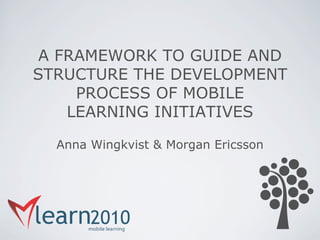
A FRAMEWORK TO GUIDE AND STRUCTURE THE DEVELOPMENT PROCESS OF MOBILE LEARNING INITIATIVES
- 1. A FRAMEWORK TO GUIDE AND STRUCTURE THE DEVELOPMENT PROCESS OF MOBILE LEARNING INITIATIVES Anna Wingkvist & Morgan Ericsson
- 2. MOBILE LEARNING • Much research and development activity, but few last or become “products” • Complex environments, but many minor “oversights” as well • Research and development in the small, deployment in the large, results in mismatch •A lack of Scalability and Sustainability
- 3. THEORY AND PRACTICE • Thereis a need for theoretical foundation and systematic approaches • Several approaches exist but no consensus • Aiming to include “the bigger picture” • Many parallels with (information) systems development
- 4. THE SOCIO- TECHNICAL SYSTEM Social Technical system system • Foundation for (information) Structure Technology systems development • Social and technical interact, and must People Tasks both be considered • Learning?
- 5. A PERSONAL SYSTEM Social Personal Technical system system system • Introduce a focus on the individual Structure • Task changes Tasks Technology from a technical to personal activity People • Better match for learning
- 6. A SYSTEMATIC APPROACH • Usethe extended socio-technical system as a basis • Allowsto leverage research and best practice regarding systems development • Introduce a framework and concepts
- 7. FRAMEWORK & CONCEPTS Areas of Concern Technology Learning Social Organization Idea Foc Trial u Stages s Project Release
- 8. KEY CONCEPTS • Stages • The life cycle of a development project • Each stage represents specific activities and goals • Areas of Concern • Views dealt with in each stage of the life cycle • Captures the Social, Technical and Personal systems
- 9. KEY CONCEPTS (CONT’D) • Focus • Mediation between the areas • Reduces complexity • Equilibrium • A steady state, where a stage work according to specification/requirements • Required for transition between stages
- 10. KEY DESIGN IDEAS • Basic idea: provide guidance, not dictate • Provide a framework for the development process • Allow for the use of tools/methods suitable for the actual project • Be easy to understand for non-experts • Be useful to other activities, such as evaluation
- 11. CONCLUSIONS AND FUTURE DIRECTIONS • Provides theoretical foundation and systematic approach to development • Introducesterms to describe important concepts, with the aim to make them understandable to non-experts • Nextstep is to evaluate the use of the framework
- 12. THE END & FYI • In honor of Carl Linnaeus, the newly established (1st of Jan, 2010) university took its name. • He was born 1707 in the region (died 1778) • Two campuses, 100 km apart (South east Sweden, cities: Växjö and Kalmar) • 34 000 students • 2 000 staff
